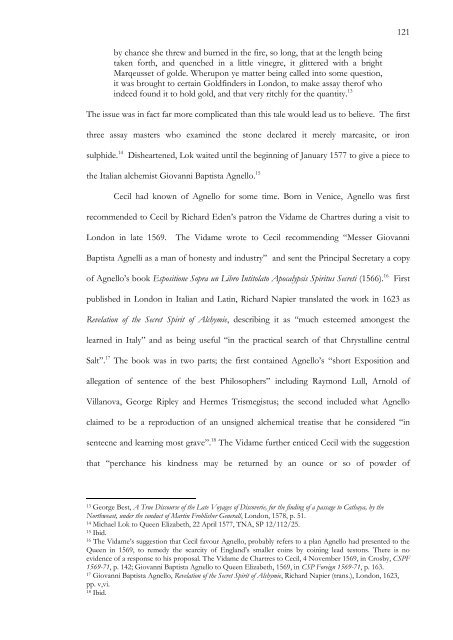The Alchemical Patronage of Sir William Cecil, Lord Burghley
The Alchemical Patronage of Sir William Cecil, Lord Burghley
The Alchemical Patronage of Sir William Cecil, Lord Burghley
You also want an ePaper? Increase the reach of your titles
YUMPU automatically turns print PDFs into web optimized ePapers that Google loves.
y chance she threw and burned in the fire, so long, that at the length being<br />
taken forth, and quenched in a little vinegre, it glittered with a bright<br />
Marqeusset <strong>of</strong> golde. Wherupon ye matter being called into some question,<br />
it was brought to certain Goldfinders in London, to make assay ther<strong>of</strong> who<br />
indeed found it to hold gold, and that very ritchly for the quantity. 13<br />
<strong>The</strong> issue was in fact far more complicated than this tale would lead us to believe. <strong>The</strong> first<br />
three assay masters who examined the stone declared it merely marcasite, or iron<br />
sulphide. 14 Disheartened, Lok waited until the beginning <strong>of</strong> January 1577 to give a piece to<br />
the Italian alchemist Giovanni Baptista Agnello. 15<br />
<strong>Cecil</strong> had known <strong>of</strong> Agnello for some time. Born in Venice, Agnello was first<br />
recommended to <strong>Cecil</strong> by Richard Eden‘s patron the Vidame de Chartres during a visit to<br />
London in late 1569. <strong>The</strong> Vidame wrote to <strong>Cecil</strong> recommending ―Messer Giovanni<br />
Baptista Agnelli as a man <strong>of</strong> honesty and industry‖ and sent the Principal Secretary a copy<br />
<strong>of</strong> Agnello‘s book Espositione Sopra un Libro Intitolato Apocalypsis Spiritus Secreti (1566). 16 First<br />
published in London in Italian and Latin, Richard Napier translated the work in 1623 as<br />
Revelation <strong>of</strong> the Secret Spirit <strong>of</strong> Alchymie, describing it as ―much esteemed amongest the<br />
learned in Italy‖ and as being useful ―in the practical search <strong>of</strong> that Chrystalline central<br />
Salt‖. 17 <strong>The</strong> book was in two parts; the first contained Agnello‘s ―short Exposition and<br />
allegation <strong>of</strong> sentence <strong>of</strong> the best Philosophers‖ including Raymond Lull, Arnold <strong>of</strong><br />
Villanova, George Ripley and Hermes Trismegistus; the second included what Agnello<br />
claimed to be a reproduction <strong>of</strong> an unsigned alchemical treatise that he considered ―in<br />
sentecne and learning most grave‖. 18 <strong>The</strong> Vidame further enticed <strong>Cecil</strong> with the suggestion<br />
that ―perchance his kindness may be returned by an ounce or so <strong>of</strong> powder <strong>of</strong><br />
13 George Best, A True Discourse <strong>of</strong> the Late Voyages <strong>of</strong> Discoverie, for the finding <strong>of</strong> a passage to Cathaya, by the<br />
Northweast, under the conduct <strong>of</strong> Martin Froblisher Generall, London, 1578, p. 51.<br />
14 Michael Lok to Queen Elizabeth, 22 April 1577, TNA, SP 12/112/25.<br />
15 Ibid.<br />
16 <strong>The</strong> Vidame‘s suggestion that <strong>Cecil</strong> favour Agnello, probably refers to a plan Agnello had presented to the<br />
Queen in 1569, to remedy the scarcity <strong>of</strong> England‘s smaller coins by coining lead testons. <strong>The</strong>re is no<br />
evidence <strong>of</strong> a response to his proposal. <strong>The</strong> Vidame de Chartres to <strong>Cecil</strong>, 4 November 1569, in Crosby, CSPF<br />
1569-71, p. 142; Giovanni Baptista Agnello to Queen Elizabeth, 1569, in CSP Foreign 1569-71, p. 163.<br />
17 Giovanni Baptista Agnello, Revelation <strong>of</strong> the Secret Spirit <strong>of</strong> Alchymie, Richard Napier (trans.), London, 1623,<br />
pp. v,vi.<br />
18 Ibid.<br />
121















